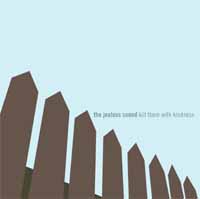|
Although the band knew that Switchfoot has a "real
heavy-duty Christian rock thing going," they figured the tour was an opportunity
to diversify their fan base. "The idea wasn't that difficult to swallow,"
Shehan said. "Rooney also was asked to be on the tour. I figured 'Whatever.
We'll be the indie rock band on the ticket. Lots of people tour with lots of different
bands. It's not like we were aligning ourselves with anything controversial. It'll
keep us busy.'" Then, right before the tour began, Rooney dropped off
the ticket. It was a foreshadowing of things to come. "We knew after the
first night that it wasn't going to work," Shehan said. He didn't give any
details other than saying the vibe was "a straight-laced Christian conservative
thing." The band left the tour immediately after fulfilling their West Coast
obligations. The episode took its toll on their morale. "Some days
I was so bummed out," he said. "I'd have L.A. hipsters come up and make
fun of us for doing the tour. My reply was, 'Live and learn.'" The
Switchfoot incident is just one in a series of indie rock life lessons taught
to Shehan after leaving his last band, Knapsack in 1999, to form The Jealous Sound
with fellow veterans guitarist Pedro Benito (Sunday's Best), bassist John McGinnis
(Neither Trumpets Nor Drums) and drummer Tony Palermo (Pulley). Palermo has since
been replaced by drummer Adam Wade (Jawbox, Shudder To Think). Within a
year of getting together, the band released a self-titled EP on indie label Better
Looking Records and hit the road with such indie-rock powerhouses as The Promise
Ring, Death Cab for Cutie and At the Drive In. With their irresistible guitar
hooks and Shehan's heartfelt, almost yearning vocals, the band quickly attracted
major-label attention. Their next career move would wind up being yet another
chapter in their lesson books. "We made a deal with Mojo, a label
that originally started as an independent but was funded by Universal," Shehan
said. "Two weeks after we signed, Mojo got cut off from Universal and Jive
picked them up. We got put in the 'maybe pile.' We figured life was passing us
by. Either Jive has faith in our band or they don't, but being lukewarm isn't
going to get anyone anywhere." At the end of the day, The Jealous Sound
and the label parted ways, but the band didn't leave empty handed, thanks to a
"play or pay" clause in their contract that would end up helping fund
the recording of their full-length. "The whole situation sucked a lot
of life out of us, but our resolve made us a little stronger," Shehan said.
"We weren't ready for the majors, anyway. The new record is the product of
that adversity, which also helped clarify what we wanted to accomplish as a band." | 
|
"I'd
have L.A. hipsters come up and make fun of us for doing the tour. My reply was,
'Live and learn.'"
| |
|
